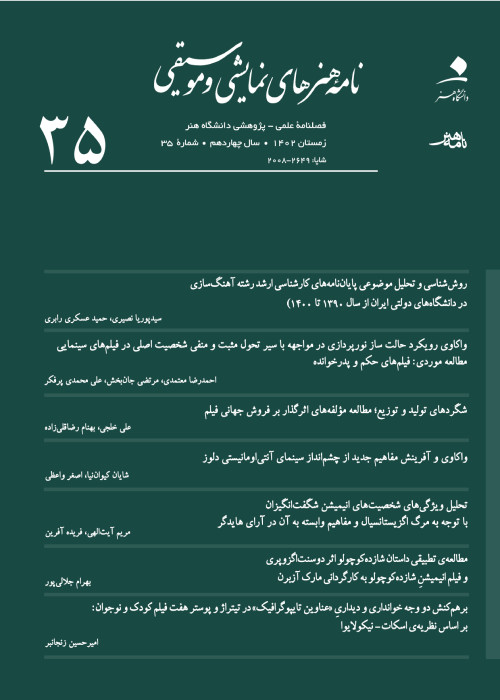An analysis on Iranian Cinema of 90th decade in mediation with the concept of Abject and Its relation to the feminine based on Julia Kristeva s thought.
Author(s):
Article Type:
Research/Original Article (دارای رتبه معتبر)
Abstract:
Julia Kristeva's concept of Abjection recognizes the relation of the subject with the objects in its environment. What is the cause of the rejection of the subject and its transformation into the Abject object is based on the separation of the child from the mother’s body and the way he/she transforms the mother into the Abject object towards the path to the symbolic, and then an action to draw protective borders for the not-yet-subject. Hence, in order to dominate one sex, the structure of today's societies, marginalizes the subject by the rules based on traditions and makes it a second sex /Abject object. What is considered in this article is the categorization of the subject in societies based on the position which is defined by the symbolic order, which leads the second sex to the status of the rejected and this is reflected in some Iranian movies in the 1390s. In this descriptive-analytical research and based on Kristeva's ideas about Abjection, the common aspects in the subjects of the Iranian movies of this decade are analyzed based on the pattern of the rejection of the horrible subject in patriarchal societies and the Abjection is considered as the basis for rejecting the threatening subject. On the other hand, the two aspects of motherhood and femininity in the subjects of the movies will be considered and the opposition of these two aspects based on the Abjection and the emergence of the Abject object in the symbolic structure will be described. In this article, the conflict of the rejected objects in the dominant structure in order to reclaim the lost rights and the status that has been taken by the symbolic order will be analyzed in these movies: Tales (1390), Nahid (1394), Subdued (1394), Helen (1394), Gilda (1395), Orange Days (1396) and Shirin’s Palace (1397). In this study, for the first time in Iran, the approach of rejection based on Julia Kristeva’s ideas is analyzed in relation to femininity and motherhood as reflected in Iranian movies in the 1390s. To do so, Kristeva's Abjection is used to consider the rejected women in primitive societies to be mysterious and threatening elements and from the perspective of a subject in today's societies as a disruptor of the tradition, and thus the distinction between femininity and motherhood in traditional Iranian society is analyzed.
Keywords:
Language:
Persian
Published:
Journal of dramatic Arts and Music, Volume:13 Issue: 29, 2023
Pages:
5 to 21
magiran.com/p2559201
دانلود و مطالعه متن این مقاله با یکی از روشهای زیر امکان پذیر است:
اشتراک شخصی
با عضویت و پرداخت آنلاین حق اشتراک یکساله به مبلغ 1,390,000ريال میتوانید 70 عنوان مطلب دانلود کنید!
اشتراک سازمانی
به کتابخانه دانشگاه یا محل کار خود پیشنهاد کنید تا اشتراک سازمانی این پایگاه را برای دسترسی نامحدود همه کاربران به متن مطالب تهیه نمایند!
توجه!
- حق عضویت دریافتی صرف حمایت از نشریات عضو و نگهداری، تکمیل و توسعه مگیران میشود.
- پرداخت حق اشتراک و دانلود مقالات اجازه بازنشر آن در سایر رسانههای چاپی و دیجیتال را به کاربر نمیدهد.
In order to view content subscription is required
Personal subscription
Subscribe magiran.com for 70 € euros via PayPal and download 70 articles during a year.
Organization subscription
Please contact us to subscribe your university or library for unlimited access!


